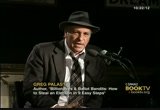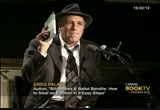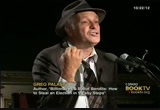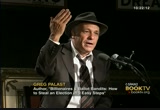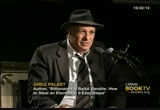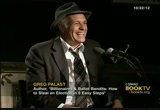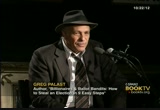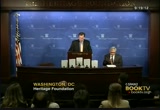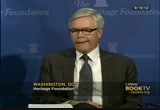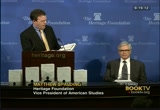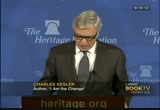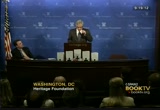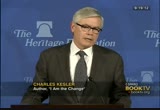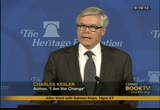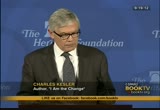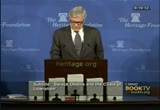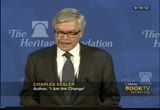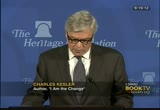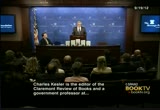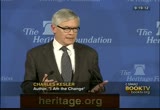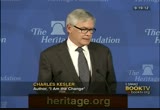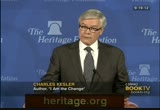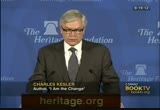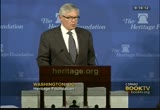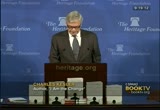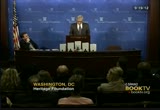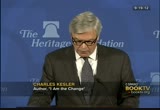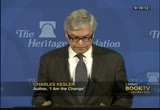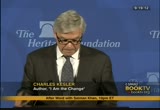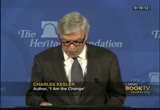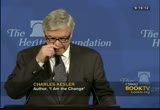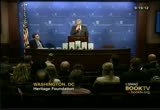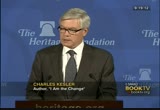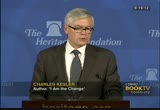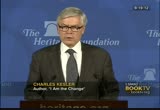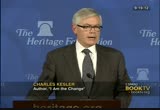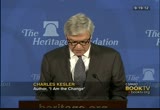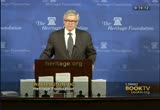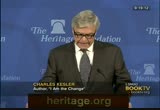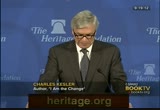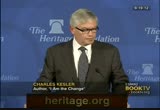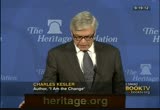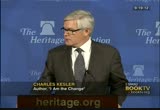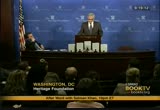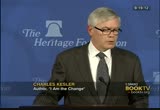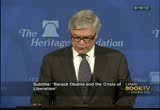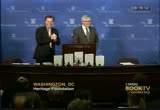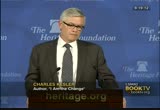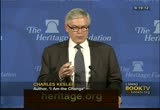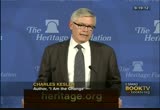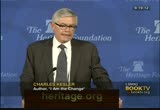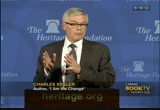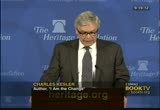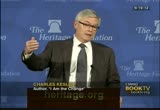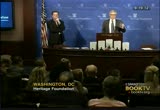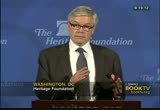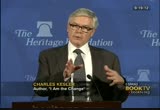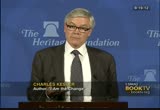tv Book TV CSPAN November 3, 2012 9:00pm-10:00pm EDT
9:00 pm
the united states. they undermine the the foreign-policy of the united states and threatened the financial system of this planet. put them out of business. that is why the vulture and his buddies have decided okay mr. obama, tell you what. we will put you out of business. bad as the war that is going on right now between the big new york banks, these trillionaire banks and the billionaire vulture funds. there is this massive war going on right now at the top of finance in that treehouse. the 1% is split, and we -- and we have the battlefield on which they play. now, what is our job? ..
9:01 pm
9:02 pm
don't want you to say, oh, my god, what do you do? the millionaires. we've won a lot of battles. we won the right to vote for african-americans at the end of the civil war, and won is again a hundred years later. we have to do it again. yeah, at the turn of the century, we have to win again at the turn of this century. 70% of the people over 65 who don't have qualified ids in wisconsin under their new id law to stop the fraud to end voters that don't exist, 70 #% of people who got id are women. it's not just a race issue. it's a gender issue. it's a class issue. we don't let them get away with it, okay? now, what do we have at the back of the book? we have something that's very, very important. including this.
9:03 pm
in the book, it's a smaller version, but download it from our website, ballotbandits.org, seven ways to beat the bandits. i'm not leaving you going, oh, my god. you can take seven steps. get the book, take -- at the back of the book, we call it the ballot condom for safe voting. seven things to do to protect your own vote and those of your loved ones. don't mail in your ballot unless you have to. make sure -- two, vote early. if they call you a felon, see -- the guy who drew the poster was inactive. he lost the vote. how do they know he didn't do his sit-ups. 9 million people listed as inactive. if you miss a vote, you go to vote, in a lot of states, you lose the vote. huh? they argument you. he never missed a vote. that's the game they play. check on line at the secretary
9:04 pm
state's office, and your county clerk, dc office. see how you are registers and make sure your name is right. vote early, get in there early, and i'm not going to give you all seven. by the way, why nine ways they steal, seven ways to protect ourselves? billionaires are always two steps ahead. one of the things is that we have to make number seven is we have to say we do have to say "now." number seven is count the votes. you can have paper ballots, all the wonderful things, but if you don't count those votes, it doesn't matter. we have to make that demand. don't count on the democrats or the republicans or anyone to do that for you. it's not in their interest to
9:05 pm
challenge the system that put them where they are. it's in our arrest to keep the system that we have fought for, okay? you know, look at two of the guys took bullets for the vote. ghandi and dr. king. i'm just asking you to take a book. go to ballotbandits.org to get the latest. i'm not asking much. they will try to steal the vote, but we can get it back. now, just to finish, and then i'll sign your books over here because i know many of you want to stay for the debate tonight, thank you to busbuys and poets.
9:06 pm
it's a non-for-profit organization that runs this place. what a wonderful place. let's support this place, support ourselves. support this foundation. support -- thank you for the work of wpfw, of booktv. if you're watching this, you're a very unusual, if not suspect person. yoir probably going -- i warn the people watching c-span right now, you're on the list. you better check your registration right now. i grew up next to the chevy plant, railroad tracks, literally on the wrong side of the tracks next to the chevy plant in van nuys, california, and we were the loser kids, poor kids who we were supposed to go to vietnam, and if we department get kill, go work in the chevy plant. it was a uaw job, made
9:07 pm
refrigerators. my father sold them, and they took away the chevy plant, loaded it up on the railroad tracks, took it down to mexico. like they took the plant to china now. they took away our lives. they took away our jobs. i'm not going to let them take away our votes too. i thank you for giving me this opportunity to help us all steal back our votes. thank you very much. [applause] for more information, visit the author's webs, gregpalst.com.
9:08 pm
>> conservative scholar presents thoughts on the obama presidency and what he deems are the, quote, "fatal contradictions, end quote, of liberalism. he speaks to the audience and answers questions for about an hour. >> good evening. i'm matthew spalding, vice president of american studies here at the american foundation. we're in for a treat. here we are, approaching election, pretends ton a water shed recognized by both political parties as a changes point, a change don't on the role of government, markets, and the future progeek story of the nation. in that debate, commercials and political rhetoric abound. sound bites, daily reactions dominate the news cycle. luckily, for us, in the midst of this, a very serious thinker wrote a serious book. having been discovered by
9:09 pm
william f. buckley, reading and writing for "national review," having overcome education at harvard university -- [laughter] and upbringing in west virginia -- [laughter] charles is a towering figure of the conservative movement. rightly so. he's a professor of government at clermont college, the co-editor with william f. buckley of "keeping the tablets of modern american conservative thought," and wrote extensively on american constitutionalism and political ideas. indeed, his addition not federalist papers, the one published, is the best selling edition in the united states. he contributes regularly to the opinion pages of "wall street journal," "los angeles times," writes about conservatory politics in the "national review, "weekly standard," among other journals. he's a senior fellow at the
9:10 pm
think tank allies which takes to the mission to restore the principles of the american founding. he is the intellectual muscle of that mission. he teaches in two of the key fellows programs. the fellows program and the lincoln program. most important, he's the editor of "the clear -- "the clermont review," and if you're not familiar with it, i perhaps you to be so and perhaps subscribe. it's, by far, the most well-written and most attractive review of books published in the united states. today, and it is so because it is edited by charles guess leer. he's been thinking and teaching about this for some time. he has now down something liberal, if not downright
9:11 pm
revolutionary which is to say he has written a book based on president obama's writings, speeches, and interviews setting out to understand and explain him as he understands and explains himself. as a result, he's come to the cop collusion that it turns out that liberals don't understand president obama and neither do conservatives. the result is the most serious and provocative assessment yet of modern american liberalism. i'm the change. barack obama and the crisis of liberalism. this is a book that, by its arguments, should and will transform the left and rights understanding of modern liberalism, how we look at its past, present, and as we shall see, its future. please, join me in working a dear friend of the heritage foundation, a friend of mine, and my teacher, charles gessler. [applause] >> thank you very much, matt.
9:12 pm
they would have properly discounted your warm praise of me if they mentioned you were my student at the very beginning instead of at the end. [laughter] it is always a pleasure to be here. matt's stewardship of the simon center for american studies here has been stellar, and it's heritage now speaks out on a variety of philosophical as well as practical questions of the day in a way that has changed the conversation in washington. it's also always an honor for me to be here in this, in the house that ed built, ed fulner, one of the great figures of modern conservatism, and he really built this place. he did build it. from nothing. and into the great empire that
9:13 pm
it is today, and i also would send greetings to the other ed, ed meiss, one of the most effective attorneys general of the united states, and many, many years, and who courageously launched, really, the whole movement for originalism in constitutional law. well, i'm here to say something about the argument of the book which is, as you can have heard is "i am the change," and the title is meant to bring out president obama's lou the 14th side. he said, "i am the state," and mr. obama came close to saying in a press conference to saying "i am the change." the title was a suggestion of my editor and publisher.
9:14 pm
i had entertained another possibility, which was suggested to me by my friend, bill, namely, barack obama, what the hell were we thinking? [laughter] as opposed to some of my conservative colleagues and friends, i don't think we get far by labeling president obama a socialist or by trying to trace his foreign origins or his secret muslim devotions, nor that even that we greatly illuminate things by focusing on him as a kind of third world ideolog as my old friend argues in his movie and in two books about obama. i think it's fairer to begin, fairer, and more useful in the
9:15 pm
end -- excuse me. to begin by admitting that obama is what he calls himself, namely a progressive or a liberal. the rest of the title is on barack obama and the crisis of liberalism. i don't mean by this the kind of crisis that liberals like, which is the kind of national emergency that invites the expansion of government, but rather crisis in the old-fashioned sense of a turning point. i think liberalism is approaching a moment, to use a word that president obama does like, in which it will either go out of business or become something much more radical, and unlike its former self or best self. obama is, certainly, the latest avatar of liberalism, up to his neck in its problems, both fiscal and philosophical as i'll
9:16 pm
argue this afternoon, but first we have to sort of answer the question, what is liberalism? for many decades after the advent of this movement, the american republic didn't know what had hit it. it took awhile to try to figure out what modern american liberalism really was. conservatives, in particular, have had difficulty defining their opponent in american poll sick -- toll -- politics. some intellectuals in the beginning of the movements, the 1950s, let's say, some fought, some argued that liberalism was an -- or a continuation of the french revolution on american soil. that's russell kirk and his
9:17 pm
school, or that it remitted the -- represented the essence of liberalism. mel bradford argued that the universalism of lincoln and anti-slavery cause was at the heart of the ideological bearing of modern liberalism, and, of course, there was always a school that saw it as the work of satan. [laughter] that's the church lady school, but, also, chambers to a certain degree. now, there may be some truth in several of these diagnosis, but i don't think any of them is adequate. on the other hand, liberals, too, i think, have had an unusual relationship with their own history and principles. if you look around at books written by liberals about
9:18 pm
liberalism, alterman to name one, but many others, you see that the favorite account of themselves, now, is that liberalism is really nothing more than as president obama said in his acceptance speech the other day quoting fdr, "liberalism is nothing but bold persistence experimentation." liberalism is a pragmatic approach, just trying to find out what works to cure our social ills. it's completely untheoretical and unideological. in fact, liberalism, if you listen to liberals these days seems downright conservative. all it's trying to do, they encyst, is keep the political system together with our economic and social evolution. in their view, it's the conservatives who are ideologs. we have terrible theories like trickle down economics and
9:19 pm
originalism. the liberals modest account of themselves is, of course, very self-interested. it's designed to shield them from charges of radicalism. if you believe them, the only alternative to their living constitution is a dead one, one that belongs to and cannot escape from a world that is dead and gone to use justice brennan's famous formulation. if you -- if you want an 18th century originalist constitution, it's going to be a dead one, they say. if you want it to live, it will be a liberal one; it will be a living constitution as they define it. at the same time that they argue their -- that they are ad modest little shop, nothing to ambitious going on there, they boast of the liberal vision, of liberal values, and, of course, the very important word in in
9:20 pm
administration, "transformation." president obama, one of the more famous utterances is we're five days away from fundamentally transforming the united states of america. that's not prague pragmatism or adjustment to changing circumstances so this modest account of liberalism is a form of conservatism, can't be the whole truth, and, in fact, i would suggest it's something more like a noble lie meant to protect the actual story of liberalism. as a political phenomena, american liberalism is almost exactly a hundred years old. it emerged in the progressive movement that broke into our politics in 1912 in that famous election won by woodrow wilson. liberalism progressed, as i understand it, across american politics in three great waves that dominated the last century,
9:21 pm
and for convenience sake, i'll point to them. the new freedom, that was wilson's administration and program. the new deal, of course, and the great society, of course, along with its tragic chorus, the new left. each wave set out to transform america as the names suggest. if you want to create a great society, that implies this is a lousy society. if you want a new deal, that implies there's something rotten with the old deal. you need to lift up america, change it, transform it, and liberalize it. this has been the constant agenda of liberalism for many generations now. obama's program is really the fourth installment of these successive waves of transformation. now, we have to notice that each one of these waves was halted, each came to an end.
9:22 pm
by 1920, progressivism was a spent force. by 1936, or at the latest, 1938, the new deal was effectively over at home. dr. new deal was replaced by dr. win the war as fdr put it, and, of course, in the 60s, the great society began, basically, after the assassination of kennedy in late 1963, was effectively over by 1966 or so. from the conservative point of view, we ought to be encouraged that each one of these waves was stopped, sometimes by a foreign war, sometimes simply by reaction at home, sometimes by both, but we have to notice as well that in each case the transformation resumed in the following generation. that fact, that with the generations delay, liberalism resumes its forward march, ought
9:23 pm
to depress or at least humble conservatives, thinking about the problem. all told, the 20th century was very much the liberal century as my late friend tom silver used to call it. conservatism as a self-conscious political movement didn't appear on the scene until the first two waves of liberalism had done their work. national review was founded in 1955. that's well after the new deal. conservatism's major political victories, at least so far, came late in the 20th century. in 1980, the election of reagan, and in 1994, with newt gingrich's revolution sweeping control of the house, away from the democrats. in a way, conservatism appears only in the last act of 20 #th century politics, and the rest of it was dominated and deeply formed by liberalism itself.
9:24 pm
all of these alluvial silts deposited itself in barack obama's formation. the crisis of liberalism is obama's crisis, and so rather than, as i do in the book, explaning and criticizing each wave or each stage of the liberal advance, i thought it better to concentrate on obama's own appropriation of them. i think my book is the first to put the story of american liberalism between two covers and take seriously barack obama's cull m nateing or at any rate, critical part in it. now, to begin with, obama calls himself a progressive. he said this in the 2008 campaign as did hillary clinton, interestingly, that they would prefer to be called progressive than liberal. now, who are the progressives?
9:25 pm
well, following woodrow wilson, the progressives' movement, the progressives' school literally believed in the inevidentability of human progress, and by literally, i mean literally opposed to what 90% of speakers mean figuratively. [laughter] they literally believed in the inevidentability of human progress and that miranda morald political advance was eventually inseparable from material and technological advance. human progress was inevitable because of the new doctrine or discovery concerning history, that history had a mind of its own, and that it had a destination in mind from its very beginnings to its dumb csh
9:26 pm
culmination. the philosopher in this sense of the term, and american liberalism had more hagel in it than the follower, critic, carl marx, a fortunate thing for americans. now, let me offer two quotations that will characterize this kind of progressivism that infiltrated american politics. when he was the president of princeton university, woodrow wilson said something that he repeated to the people when he was running for election in 1912, and he even made sure it was included in the volume of his edited speeches from the 1912 campaign called "the knew freedom." wilson said that the objective of college education should be to make the sons as much unlike their fathers as possible. now, think about that for a moment. to make the sons unlike their
9:27 pm
fathers as possible. not because the fathers were not splendid fellows, and not to be sure because he was averse to cashing their tuition checks for their sons, but because the fathers, as he explained it, necessarily belonged to a world that was dying, and the sons had to be fitted for a better world that was dawning. wilson implied that the whole reorientation of moral and political education from devotion to the best that had been fought, said, and dope in the past to the dreams of a better, essentially, unprecedented world to come was absolutely essential in american higher education. the only way to study the past was as an anticipation of something much grander to come. compared to the future, he
9:28 pm
declaredded, the present is of nothing. the past, he implied, was less than nothing. now, the american founders viewed the great figures of the past, of their past, more or less as contemporaries because human nature didn't change, they thought. they tried, at least at their best, to understand the past as it had understood itself before frying to understand it differently or better. hence, fathers were not ruled out as sources of wisdom, and it was even advisable to trust people over 30. [laughter] thus, you could have a country with founding fathers whose ancient wisdom would nonetheless be relevant to problems and
9:29 pm
which to revert in order to think about dealing with contemporary problems. for the progressives, this notion of taking all men everywhere at any time in history, as in the sense sharing a nature could not be more benighted and fruitless. they assumed because we come later, we see better, further, and wiser. when wilson warned against blind worship of the constitution, he was the first president to criticize the constitution. he meant to rule out, really, the hat of veep -- habit of venerating the law, looking up to the law, to the rule of law, and above all, the law of laws in the constitution. they -- for them, you could see this and say the way woodrow wilson treats the federalists.
9:30 pm
he talks about it, but he has little acquaintance with it. he never studied it carefully as one might, in many colleges and universities today, because he assumed that the meaning of the federalists was what the federalist did, what it accomplished, the works that proceeded from it. the dock -- doctrines of the federalists were operation noel belonging to the world that had been surpassed by contemporary america. this was a principle that the progressives applied ruthlessly to religion as well as to education and to politics. that's why president obama is not embarrassed to say, as he says in the second book, "the audacity of hope," that he believes in the living constitution. the phrase, and to the large extent, the idea comes from wilson. the term sounds so green, so natural, so organic, like one of
9:31 pm
those environmental laws republicans are always opposing according to the democrats, but that's a deliberate misdirection. in the living constitution that woodrow wilson and president obama salute, the principle of the constitution is not natural selection, but artificial selection. the theory is or the reasoning it we've evolved to the point where we can control our own evolution, where we can take charge of society's development as a whole. the living constitutionist, as they both, i think, would describe it, is really a mandate for experts to take charge of government, to experiment on the sovereign people rather than simply represent them, to build a new state and breed, as it were, a new people.
9:32 pm
it is constitutional eugenics. amid the seeming flux of the living constitution in which change is the law of life and all constitutions are supposed to be subject to darwin competition, able to grow, expand, change, adapt, it's puzzling and revealing to discover that some things are permanent, even in the living constitution. here's my second quotation from president obama speaking about his health care bill. quote, i'm not the first president to take up this cause, he told congress in september 2009, but i am determined to be the last. again, you have to ponder that he is determined to be the last to deal with national health care. in other words, he considers his law progressive and progress to be irreversible.
9:33 pm
some things can want be repealed, cannot be decisively modified, limited, and this is true, basic programs of the welfare state and of obamacare in the newest addition to the ensemble. this is the living constitution in action, one might say, to the extent that the actual constitution, the written constitution would overrule or might overrule obamacare, why then it's the written constitution that's unconstitutional from this point of view because what's really -- what the meaning of the living constitution is it's the small constitution. it's government as we do it now. trying to turn back the clock on obamacare to repeal obama care would violate that fundamental law of social development that you can't go back according to liberalism. that's the -- the real
9:34 pm
government now are the -- is the programs, the ensemble of programs in the modern states, and you have to find a way to interpret the written constitution to accommodate them rather than trying them against the standard of the written constitution. now, obamacare is, i think, the central piece of legislation for the evaluation of obama's presidency. undoubtedly, that marks a triumph of liberalism. alone, that qualifies obama's face for the liberal mount rushmore. liberals had been lusting after national health care for a hundred years, since teddy roosevelt and the progressive party platform of 1912 called for it, the state of the union address that pro claimed the second bill of rights under fdr. for generations, liberals have sought this holy grail, and only
9:35 pm
obama was able to find it, to deliver it, to create the first comprehensive national health care plan, not targeted just at the poor or the sick or the old, but in everyone, a hundred percent solution, or at least in theory a 100% solution. now, in this sense, of course, obamacare is the latest triumph of entitlement rights. one of the new deal's signal contributions to liberalism as we know it today. entitlement rights mean socioeconomic rights as they are sometimes called, like the right to health care or to a job or to a vacation from the job or to security and old age. all of those kinds of socioeconomic rights that demand programs that have transformedded and recentered our politics.
9:36 pm
together, these implied a new view of the social contract. the old view pervading the declaration of independence was that individuals had preexisting natural rights or god-given rights. individuals by unanimous consent formed a social compact, set up governments by majority vote to secure these rights, and the people's safety and happiness, but fdr's new view, which was integral to liberalism, was that the contract was between the people, as he put it, and their rulers. according to him, the people agreed to give the government power in exchange for the governments giving the people rights. individuals as such, you notice, drop out of this contact, and with them, individual rights. under the new deal theory, individuals get whatever rights they receive as members of the people or of a group that is
9:37 pm
part of the people. in short, all individual rights, in this theory, are actually group rights, and so this theory of a contract, not among individuals, but between the people as a kind of pre-existing whole and their rulers, or the government, is much more like magna carta and it is like the declaration of independence. it's strangely and almost medieval theory which is just what hayek put his finger on in the title of his famous book,ed" road to serfdom." there was a kind of return, in liberalism, to a much older, more statist view of the contract which liberties are grants of relief from government rather than claims against government, preexisting claims against government. as a result of this new
9:38 pm
understanding of the social contract and new importance of social and economic rights, we have what i call the first law of the government which is that there's no reason to fear government no matter how strong it becomes because the bigger government is, the more rights it can grant to the people. what's not to like? if our rights are dependent on government, why shouldn't we be? that's really the lomingic of the liberal social contract, i think. of course, someone has to pay for the new rights. every right implies a duty, but welfare state duties are both vague and vaguely assigned. who is supposed to pay for the houses, the medical care, the doctors office visits, the hospital rooms, the automobiles, the air-conditioning, whatever is needed to live a decent
9:39 pm
standard of living? is it the rich? certainly, a lot of liberal rhetoric expended to try to make that case, but, of course, at some point, you face the difficult fact that there's not enough money in the rich to run this system for very long. liberals have also suggested that it's not so much that the rich pay, but that everyone crickets. this is like a giant social insurance scheme. you pay, you know, your premiums, and eventually you get benefits. everybody chips in, maybe a mandate to ensure everybody chips in, but the spirit is that of social solidarity and mutualizing of risk taking, but the problem is that most people extract more benefits than they contributed to the programs. hence, this argument doesn't go
9:40 pm
very far either. there are not many possibilities left if the rich and everyone can make this system go. in reality, who pays is really the young or as one might say, the young suckers, who are taxed to pay for a good standard of benefits for older retired people, but who may not see such benefits for themselves when they're ina-r that same situat. this is, really, thee problem that is leading to liberalism's fiscal implosion. as mrs. thatcher equipped, we're running out of other people's money. finally, obama is a child of the 60s, literally. he was born in 1961 to an
9:41 pm
interracial couple. his father was a kenya socialist, anticolonialist, and that much of the argument is undenial. his mother was a dreamy flour child who eventually earned a doctorate in anthropology. for obama, the 1960s ran until 1980s until the success of ronald reagan was clear. as a young man, obama suffered a kind of 60s envy. he missed out on the civil rights movement, and on the new left, but he determined to experience them vicariously, and so he tried drugs, as he confess
9:42 pm
es, cannily, in his book, "dreams of my father," rallied against south africa, gave speeches, community organized, tried to get in touch with the black speerns, and, in general, he searched for meaning to use a formulation that he would not reject. in other words, he very much shared the 60s existentialist mood that everyone must find his own meaning in life, and find his own way in life because there's no meaning out there. there's no objective source of meaning that one can point to or rely on. he shared, also, the civil rights movements determination to make history rather than to let it happen or trust it to redeem injustice in its own good time.
9:43 pm
as well, obama, i think, shared the post modernist suspicion that universal values, as he sometimes calls them, are not universal, and probably not true in any objective sense. one can see these ideas at work in "dreams of my father." the heavily fixalized ought -- autobiography or memoir that he wrote. politicians notoriously lie. this is not a surprise, but no future president ever boasted that he was making stuff up in order to tell his story the way he wanted to tell it as obama does. self-creation is a very important word to obama. in the -- one of his earliest speeches about lincoln, really, it was his announcement speech of the presidential candidacy, i
9:44 pm
believe, in 2007, done in springfield, and he somehow or another found the occasion to compare himself to abraham lincoln, both, after all were tall, gangly lawyers, and both gave speeches in spring field. [laughter] if you look what he says about lincoln, it's revealing. i mean, for him, lincoln stands for self-creation, the ability to restart your life to make yourself into whatever you want to be, to choose your values and pursue your own dreams, your own principles. i'm not sure that that's exactly how abraham lincoln would have seen himself, but that's in keeping with the general liberal approach, which is you're not so much concerned with how someone like washington or lincoln understood himself; you're
9:45 pm
interested in what use you can make of them in your own time primarily. well, here's where obama goes far beyond old-fashioned liberalism, the creed of woodrow wilson and franklin roosevelt. obama doubts or comes close to doubting the inevidentability of progress, partly because he doubts there's fixed goalposts or standards by which to measure progress. the profit leader, as it were, the great hero of so much liberal political writing, wilson, fdr, jfk, but didn't work out as they had hoped, lbj, and others, the prophet leader is therefore, on his own, forced to tell stories about the future he cannot know or discern, but can, if his will to power is sufficiently strong, will into existence.
9:46 pm
if history, in other words, has no happy ending in store, if there's no guaranteed values of its own, then the leader may have no choice but to impose his values on the chaos of time. thus, liberalism has not only a fiscal crisis confronting it, but also, i say, a philosophical cry -- crisis. liberals, especially in the academy, post modernists like richard among others, tend to no longer believe liberalism true or right in any objective sense. obama is not a post modernist i'm happy to report, but the confusion about truth, very visible in his discussion of slavery and the declaration of indense in "the audacity of hope," and his confusion of the truth combined with the liberal
9:47 pm
impatience with the constitution and its forms, makes a harrowing conversation. i am the change, as mr. obama almost said, reminds us that not every change is an improvement. a movement that began by promising to every american a new freedom and a new deal, beyond necessaritiveness runs from paying its own bills, a movement that promised complete spiritual fulfillment in a great society incoming the right to choose one's own values and lifestyle now verges on confessing that no lifestyle can be said to be better than any other. the movement that put such faith in its leaders' ability to understand, predict, and control the future now faces a very
9:48 pm
uncertain and perilous future with or without barack obama. thank you very much. [applause] >> we have time for questions from the audience, about the book, or for kesler. >> but do we have time for answers? [laughter] >> depends how long the answers are. yes, sir? >> i think there's a microphone here as well so we can hear you. >> okay. owing. mr. kesler, i had a question. >> uh-huh? >> if president obama gets a second term, do you think this could be a permanent change in american society towards welfare state? expansion, sorry. >> very likely.
9:49 pm
i mean, one can't be, of course, sure, but one can be sure that he will do everything in his power to prevent any substantial modification of obamacare. he's a very different kind of liberal than bill clinton in this one respect at least. clinton, when hillarycare failed in the early two years of clinton's first term, he accommodated that reality, and he became famously a kinder center left politician. he triang giewlated, as they used to say, moved right ward in effect, and he got rid of large legislative initiatives and settled for rather small ball kinds of reforms. it's clear, looking at the two men, and especially reading between the lines of the speeches that obama and -- that
9:50 pm
between obama, there's no love lost, and obama holds clinton in a contempt because he thinks he's really the only politician in recent democratic history to have had the chance to transform america. the others were, you know, didn't have the talent or didn't have the opportunity that they could have seized. he had both. he blew it. he blew it because of his personal indiscipline and because, for whatever reason, clinton believed the reagan revolution was here to stay, and that he had to accommodate it if he were to survive, and if any kind of democratic liberalism were to survive. obama never believed that. obama believes that it's the reagan revolution that's trance yent, and the obama revolution that's here to stay. he will -- you will never catch
9:51 pm
him saying the era of big government is over because he believes the era of big government is not over. he believes that, in fact, to the extent the era of big government is fading is because the era of bigger government has arrived. he has -- as he reads the tea leaves, he thinks history is favors and expansive state even though it will -- the factor expands, the quicker the crisis comes fiscally, and he is, as much as tells you this in his speeches and books because he, you know, in several speeches, he said, we were not legislated just to solve crisis like the great depression or the economic downturn. i mean, you know, piddly stuff. we were elected to change
9:52 pm
history. the reason why he spent the first two years pursuing obamacare, which looked, at many points, a will of the whisp, was not that he couldn't figure out he had to do more on the economy to get reelect the, but because he was willing to risk reelection for the sake of doing something permanent to expand the state and to realize more of liberalisms goals. he is, to that extent, he is doing what the markists call heightening the contradictions. he is, in a certain way, begging for the crisis to come, accelerating the crisis, and that's because, i think, and i could be wrong about this, it may be he finds a way to compromise in the second term, if there is one, but i think the game he's playing is more
9:53 pm
ideological than that, and i think that he would not reject the chance to put it conservatively to have a real fiscal crisis in which there's no stark alternatives. either taxes must go up enormously in order to fund the present promises and some of the future promises made in the welfare state, or we must fundamentally trim the welfare state, and i mean, that would be an opportunity, as i say in the book to sweetennize the american economy and to move from a federal government that spends sw somewhere between, you know, 19% or 20% of gdp every year to one that spends 35% of gdp every year which would be a transforming effect, not one i welcome, on american politics and on the american character.
9:54 pm
>> that begs to question what happens then if he's defeated? what happens to liberalism? >> well, if -- that depends on the magnitude of the defeat and whether it's followed by conservative advance. i mean, if, i mean, it's not impossible, looks unlikely now, but it's not impossible that romney could win and bring in republican senate and, you know, maintain republican control of the house, and could confidently and expeditiously set out to replace, repeal and replace obamacare and undo other things done by the obama administration. if that works, if it lasts, if republicans don't run away from it, and at the polls, in 0 2014 # and 2016, voters confirm the move, liberalism is in a spiritual crisis. to the extent they have the
9:55 pm
old-time religion, it's because they believe they're on the right side of history. if history turns against them, then the -- the ground of their confidence is shaken. in this respect, you know, it's not unlike k.. -- unlike communism. communism, a very different phenomena, but that rests on a marxist confidence that in the end there will be universal revolution and 5 stateless society, and it all will make sense, but when they began to doubt that, you know, then the foundations of marxist lennonism come ubl -- crumbled, and with the soviet union disappeared before our eyes. it's not impossible that liberalism could go poof. i think it's unlikely because i think liberalism has a lot more
9:56 pm
vitality than something like communism had. it's a lot more democratic. it's a lot more connected to the people. it's a lot more flexible, and, hence, we'll have a lot more fight in it, i think. >> yes, sir? >> i wonder if you could shed some light for me, if you could tell us, for a moment, from the per speck -- perspective of someone who is a proponent of living constitution -- >> uh-huh -- >> if he's really a true believer that deviating from the original intent of the constitution is something that is very desirable? how does he justify, you know, parting from the original
9:57 pm
intents of the constitution -- i mean, where do you draw the line in a serious self-assessment as a proponent of the living constitution? >> well, in wilson's hand, the living constitution is not something primarily they are concerned with, but something all branches of government pursue, and for him, primarily the objective, more than the courts or legislature. his idea was the president would be in the lead in a quasi-parliamentary way drag the legislature and courts with him eventually. to answer your question, liberals have always, and i think i write about this atsome length in the book offered, and i eluded to it here at least,
9:58 pm
offer twoing thes of themselves, and one is that -- twoing thes of themself -- two accounts of themselves because deviating was to produce a living constitution that could, you know, a constitution interpreted as john marshall said that has to be flexible and able to meet the needs of the day, and at the same time, the same people will say that the theory of the old constitution has to be emptied out and a new theory put into that old bottle. these are two contradictory accounts, but i think the -- the more fundamental, the more serious, and the more controversial one was you really have to completely change the accepted theory of what government is for in order to charge officials, whether judges or presidents or legislatures with the purpose and the authority and the understanding
9:59 pm
to do their adjustments, to keep it current, and on this question, wilson is, he is, in a way, democratic with a small "d," and his idea was you never get too far ahead of where the people are. he, you know, it's probably not widely known that wilson very much admired burke, a critic of the french revolution, and he thought one was crazy because they got too far ahead of what french society could absorb. his vision of the future was too forward looking, and the kind of leader you wanted to be was tieded to the sentiment the of the people, the felt needs of the people, and, thus, never too far ahead of them. you would lead them, means you
137 Views
IN COLLECTIONS
CSPAN2 Television Archive
Television Archive  Television Archive News Search Service
Television Archive News Search Service 
Uploaded by TV Archive on

 Live Music Archive
Live Music Archive Librivox Free Audio
Librivox Free Audio Metropolitan Museum
Metropolitan Museum Cleveland Museum of Art
Cleveland Museum of Art Internet Arcade
Internet Arcade Console Living Room
Console Living Room Books to Borrow
Books to Borrow Open Library
Open Library TV News
TV News Understanding 9/11
Understanding 9/11